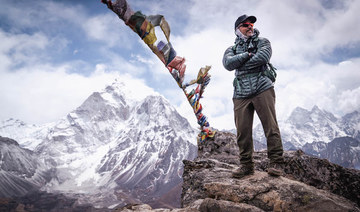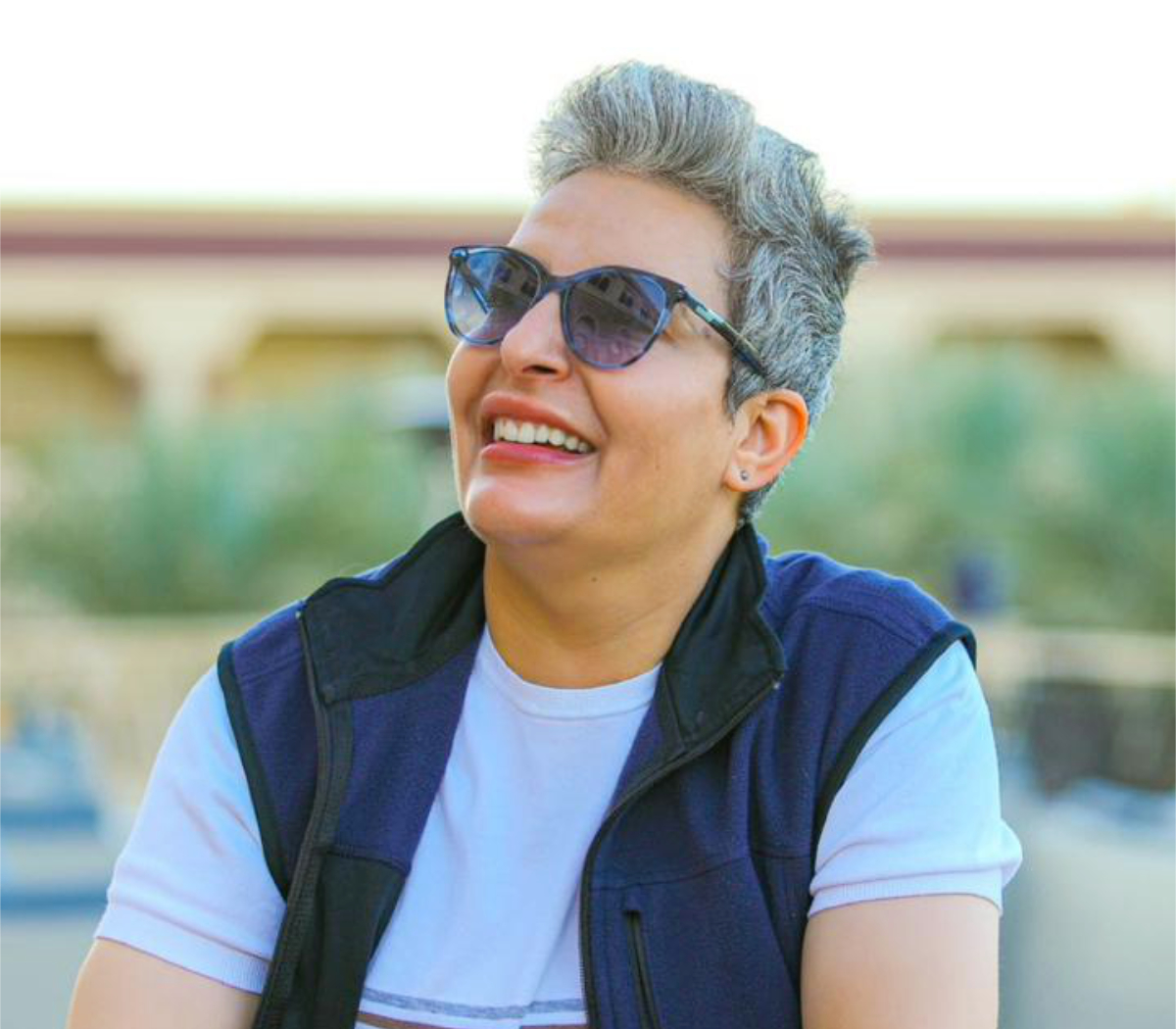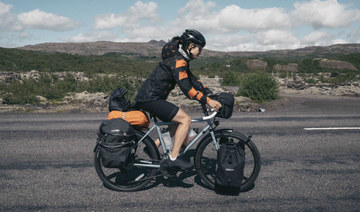RIYADH: As a child, Nasser Al-Sadhan would spend hours watching documentaries on countries such as Kenya and Ethiopia, fascinated by the diverse landscapes and cultures depicted on the screen.
As an adult, Al-Sadhan has been able to turn his childhood fantasies into reality by visiting these countries. Each step he takes in these unfamiliar territories brings back memories of the wonder and amazement he felt as a child.
Al-Sadhan is not your average traveler. The 35-year-old, born and raised in Riyadh, has backpacked to an astounding 110 countries, each journey leaving a mark on his soul.

Nasser Al-Sadhan is not your average traveler; the 35-year-old, born and raised in Riyadh, has backpacked to an astounding 110 countries, each journey, and its chance encounters, leaving a mark on his soul. (Supplied)
Traveling far enough, he discovered that finding yourself is not just a cliche — it is a transformative experience.
At 22, he moved to Canada and then Australia for his master’s degree and PhD in computer science specializing in AI.
“I moved back to Saudi Arabia at the end of 2019 when I became a professor of AI at King Saud University in Riyadh. Now, I am focusing on exploring the world and flow art,” Al-Sadhan told Arab News.
HIGHLIGHTS
• As a child, Nasser Al-Sadhan was intrigued by the sight of backpackers at the airport.
• Backpacking taught him how to live in the moment and seek new opportunities.
• He goes by @flowmad_ on Instagram, where he documents his travels and writes about the people he met along the way.
He goes by @flowmad_ on Instagram, an amalgamation of his love of flow arts and being a nomad.
Al-Sadhan began his backpacking adventures in 2014. Even as a child, he was intrigued by the sight of backpackers at the airport. “I never had the chance to do it (backpacking) until I moved to Canada for my higher education and had more free time and income,” he said.

Nasser Al-Sadhan is not your average traveler; the 35-year-old, born and raised in Riyadh, has backpacked to an astounding 110 countries, each journey, and its chance encounters, leaving a mark on his soul. (Supplied)
He fondly recalls one late-night conversation with his roommate Francis from South Korea. Al-Sadhan said that as they browsed countries on Google Maps, he felt a sense of wanderlust stirring within him.
He knew that that moment was the catalyst for his journey into the unknown. It ignited a spark in him that would ultimately lead him to thrilling experiences across the globe.
“I backpack because normal traveling where everything is planned and everything is booked doesn’t sound exciting to me … there isn’t any room left for spontaneity, no room for unplanned experiences.”

Among Al-Sadhan’s travels to strange lands is his visit to the infamous Darvaza Gas Crater, a natural wonder in Turkmenistan. (Supplied)
He rarely if ever plans his flight and accommodation in advance. “The two biggest obstacles that I had to overcome — that later proved to be very valuable — is going with the flow … not having a plan and not booking anything in advance,” he said.
Backpacking taught him how to live in the moment and seek new opportunities.
“I would often book a flight for the same night I wanted to travel so that I could reach the city and find accommodations there. But sometimes I would not find any place to stay,” he said.
The Saudi nomad’s willingness to embrace uncertainty and new experiences has fostered meaningful connections that transcend geographical boundaries, sometimes restoring his faith in humanity.
Once he slept on the beach in Sri Lanka because he couldn’t find any accommodation. “But then I met an amazing Ukrainian group, and they offered me a place to sleep,” he recalled. “We became friends and we ended up spending the next two weeks together.”
On one trip, Al-Sadhan’s phone stopped working while he was on a train in Poland. “That is when I saw two guys from Brazil with backpacks, so I asked them if they knew of a hostel, they said ‘Yes,’ and I followed them to it.”
The trio traveled together for the next three days and became friends.
“During my trip to Japan, I did not have the local currency on me and couldn’t pay for the bus fare when a girl helped pay it for me.” He noted that the two became friends as she showed him around the country.
Al-Sadhan said that this no-plan approach has pushed him out of his comfort zone and allowed him to break free from his cocoon.
“I have been traveling the world for the past 10 years and never had a hardship that resulted in a bad experience,” he said.
These chance encounters have enriched his travels, exposing him to diverse cultures and perspectives.
Without a fixed itinerary or set plan, he allows himself to be guided by the winds of the moment, resulting in unforgettable experiences and connections.
In 2016, before moving to Australia from Canada, Al-Sadhan made a pit stop in New Zealand and that trip restored his faith in humanity.
“New Zealand is a pretty expensive country and at that time I was a student, so I decided to hitchhike the whole way across the country because I didn’t have much money,” Al-Sadhan said.
Hitchhiking was faster than taking buses and allowed him to connect with individuals from various backgrounds, including a kind-hearted mother and her child, and a scientist studying birds on a remote island inaccessible to the public.
An experience backpacker, he revealed a trial-and-error approach to packing the essentials and emphasized the importance of minimalism and focusing on functionality rather than style. On his trip to New Zealand he carried “a functional sleeping bag, tent and small air mattress.”
During this five-week trip, Al-Sadhan gained a deep appreciation for the importance of community. To keep his spending to a minimum, he resorted to couch surfing — a form of accommodation where travelers stay at the homes of locals for free.
He stayed at a communal apartment with four rooms and a living room with 30 people staying in it. “I stayed there for about six days because I enjoyed it. People from various countries were there, creating a sense of community where everyone helped each other,” Al-Sadhan said.
There was only one rule in this apartment: “If you cook, you cook for everyone.”
“One day someone came in with a lot of fresh fruits and vegetables and when I asked where they got them, they said ‘From the dumpster behind the supermarket.’”
While dumpster diving, they found a variety of items, including fresh produce, bread, and more. “If we found something like ice cream or eclairs, it would go to the person who went dumpster diving that day.”
While dumpster diving in a foreign country, he discovered a vibrant community of people from diverse cultures coming together to share resources.
Dumpster diving saved him money, but it’s not just about finding free food, but about building relationships and experiencing a new culture.
Among his travels to strange lands is his visit to the infamous Darvaza Gas Crater, a natural wonder in Turkmenistan. It is also known as the “Gates of Hell,” as it is a fiery pit that has been burning continuously for more than four decades, emitting a captivating blaze that lights up the night sky.
“We reached the gas crater before sunset and there was nothing to see but sand everywhere, but after sunset is when cylinder-shaped fiery lights beam from the hole.” Al-Sadhan recalled the eerie sight of birds swirling around the flames, dancing against the darkened backdrop of the desert area.
“My tour guide explained to me that these birds are feeding on the flies attracted to the light of the flames,” he said.
He had another life-changing experience in Varanasi, India. Unlike the rest of the places Al-Sadhan has been to, which he described as somewhat similar, “Varanasi is the exact opposite of that; everything is different, and nothing is the same.”
During his five days there, he had the opportunity to witness the customs and traditions of the region, including the public funeral procession and cremation that takes place along the banks of the sacred Ganges River.
Watching the ceremonial cremation of a middle-aged man, Al-Sadhan said: “They have a different social and spiritual relationship with death.” He vividly described how the bodies were wrapped in cloth before being placed on the funeral pyre and set ablaze.
The solemnity of the ceremony, combined with the spiritual energy of the festival, made him reflect on the fragility of life and the importance of cherishing each moment.































